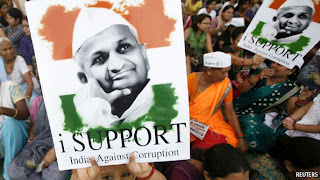FROM his fasting-bed in the heart of Delhi, a frail old man in homespun cotton has channelled Indian rage over a string of high-profile corruption cases, tying the entire government in knots. Anna (“Elder Brother”) Hazare says he will continue his hunger strike until a rotten government passes, word-for-word, a bill creating a Lokpal, a powerful new anti-corruption body—and he has set an August 30th deadline. The Congress-led government of Manmohan Singh has already offered a Lokpal of its own, but Mr Hazare says it is too weak. Thanks to this master of political theatre, a discredited Indian government faces one of the biggest stand-offs with the people since, well, Mahatma Gandhi.
After revelations of stupendous corruption when politicians granted telecoms licences and prepared Delhi for the 2010 Commonwealth games, Indians are right to be furious. Yet Mr Hazare and his followers could end up doing more harm than good. The man is no saint, and his movement displays a whiff of Hindu chauvinism (see article). The activists’ slogan—“Anna is India, India is Anna”—is absurd. Their campaign is tinged with nostalgia for a golden age before economic liberalisation when government was, in their view, clean and decent.
This is a dangerous misdiagnosis. Corruption was rife even before liberalisation: the Bofors scandal in the 1980s brought down the government. The economic liberalisation of the past 20 years—in particular, the dismantling of the “licence Raj”—has vastly reduced the scope for corruption, not increased it. Mr Hazare’s proposed cure is equally mistaken. India already has anti-corruption bureaucrats, who have failed to solve the problem. Creating another huge bureaucracy, which a Lokpal would be, is not the answer.
The right and wrong channels for anger
Mr Singh should stand firm against the Hazarites, supporting the ends they espouse but decrying the means they propose. He deserves some credit for what he has tried to do. His economic policies, along with a 2005 freedom-of-information act, have tended to mitigate corruption. The government’s new Unique ID number scheme, in which 29m Indians are already enrolled, could have a revolutionary effect. Social benefits could be paid directly into recipients’ bank accounts rather than as subsidised fuel and food that is too easily stolen by crooked officials.
Yet Mr Singh has so far appeared listless. He should have moved faster to sack ministers in the wake of the telecoms scandal. And much could be done to make bribe-taking harder. One idea is to put public tenders online. A fairer and more open system is needed for acquiring development land from farmers. The government should do more to protect whistle-blowers. And to curb the appetite for illicit campaign funds, electoral reform should limit contributions and require that their source be revealed.
All this requires the commitment of a strong leader. As the loyal retainer to Congress’s family dynasty, Mr Singh lacks real power. But the dynasty’s matriarch, Sonia Gandhi, is unwell, while her son, Rahul, has run away from the Hazare controversy—hardly reassuring, since he is the presumed next prime minister. Given such a vacuum, it is no wonder the public does not trust political parties to clean up the system and prefers to join Mr Hazare’s crusade. The Gandhis’ hold over India is doing the country no good. If Indians want to clean up government, they need to get rid of dynastic politics.

